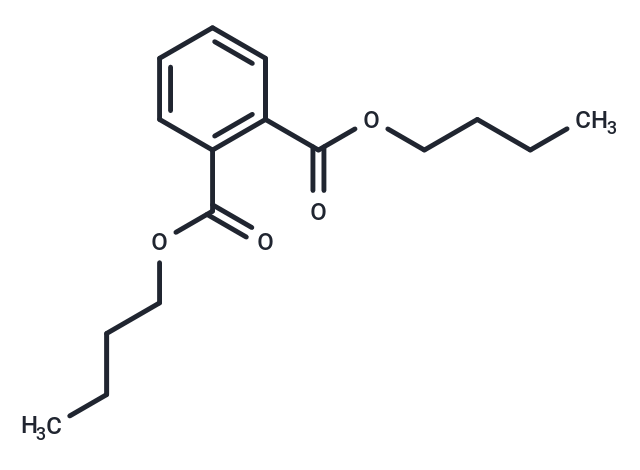Shopping Cart
- Remove All
 Your shopping cart is currently empty
Your shopping cart is currently empty

Dibutyl phthalate (1,2-Benzenedicarboxylic acid) is a plasticizer, commonly used in industrial manufacturing, that causes cardiac damage by disrupting Ca(2+) transfer from the endoplasmic reticulum to the mitochondria and triggering subsequent cellular death.Dibutyl phthalate induces oxidative damage in the brain of zebrafish.

| Pack Size | Price | Availability | Quantity |
|---|---|---|---|
| 100 mg | $58 | In Stock |
| Description | Dibutyl phthalate (1,2-Benzenedicarboxylic acid) is a plasticizer, commonly used in industrial manufacturing, that causes cardiac damage by disrupting Ca(2+) transfer from the endoplasmic reticulum to the mitochondria and triggering subsequent cellular death.Dibutyl phthalate induces oxidative damage in the brain of zebrafish. |
| In vitro | The compound was isolated by direct fractionation of ethyl acetate extracts of air-dried seeds and pods and subjected to microbial susceptibility testing. Antibacterial screening results show that Acacia ethyl acetate extract has the highest activity against the tested microorganisms, with an inhibition zone diameter of 27-32mm, and is effective against Salmonella typhi, Escherichia coli, Streptococcus faecalis, Staphylococcus aureus, Candida krusei and Shigella dysenteriae [1]; grass carp hepatocytes were treated with 300 μM Dibutyl phthalate for 24 h, and hepatocytes were treated with 1 μM taxolin (TAX) for 24 h to study its antagonistic effect on Dibutyl phthalate. After exposure to Dibutyl phthalate, hepatocyte oxidative stress levels and inflammation increased, and the mRNA and protein expression of apoptosis-related markers significantly increased, leading to hepatocyte apoptosis [6]; treated with 10–1000 μg/ml Dibutyl phthalate When follicles are exposed to 48 hours, Dibutyl phthalate is harmful to ovarian antral follicles when the exposure is ≥10 μg/ml. The presence of MBP does not affect the growth and vitality of Dibutyl phthalate on antral follicles [3]. |
| In vivo | Treatment with dibutyl phthalate (DBP; 10 or 100 mg/kg/d, po) for five weeks in adult male mice induced immunotoxicity by reducing total leukocyte counts and classical monocyte and T helper cell populations, but not classical monocytogenes. Increased populations of nuclear cells and PMN-MDSCs, leading to sustained immunosuppression [2]; Dibutyl phthalate (200, 400 or 600 mg/kg/day) causes weight loss, impaired spermatogenesis, serum follicle-stimulating hormone and testosterone in mice Decreased levels, changes in testicular LDH, increased LPO and decreased enzyme antioxidant levels, accompanied by histopathological abnormalities [4]; Dibutyl phthalate (6.25, 12.5, 25, 50, 100 and 200mg/kg) may produce Some neurobehavioral adverse effects [5]. |
| Alias | 1,2-Benzenedicarboxylic acid |
| Molecular Weight | 278.34 |
| Formula | C16H22O4 |
| Cas No. | 84-74-2 |
| Smiles | O=C(OCCCC)C=1C=CC=CC1C(=O)OCCCC |
| Relative Density. | 1.043 g/cm3 at 25℃ (lit.) |
| Storage | store at low temperature,keep away from direct sunlight | Powder: -20°C for 3 years | In solvent: -80°C for 1 year | Shipping with blue ice. | |||||||||||||||||||||||||||||||||||
| Solubility Information | Ethanol: 30 mg/mL (107.78 mM), Sonication is recommended. DMSO: 80 mg/mL (287.42 mM), Sonication is recommended. | |||||||||||||||||||||||||||||||||||
Solution Preparation Table | ||||||||||||||||||||||||||||||||||||
Ethanol/DMSO
| ||||||||||||||||||||||||||||||||||||

Copyright © 2015-2025 TargetMol Chemicals Inc. All Rights Reserved.